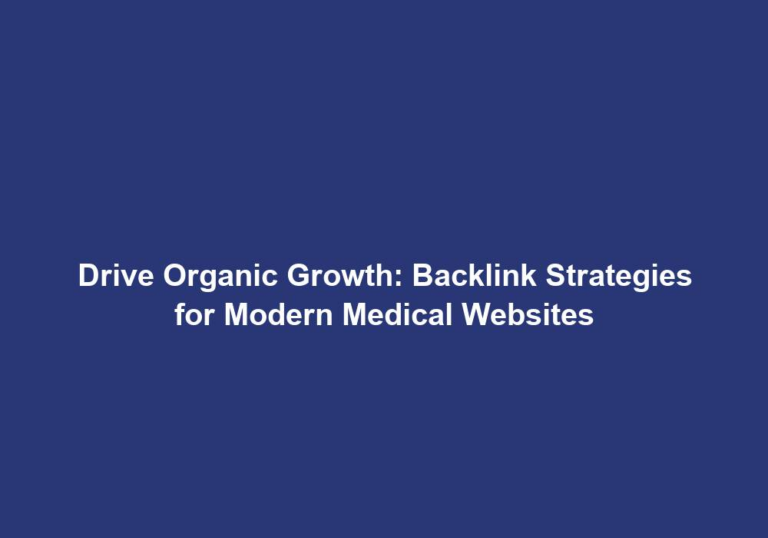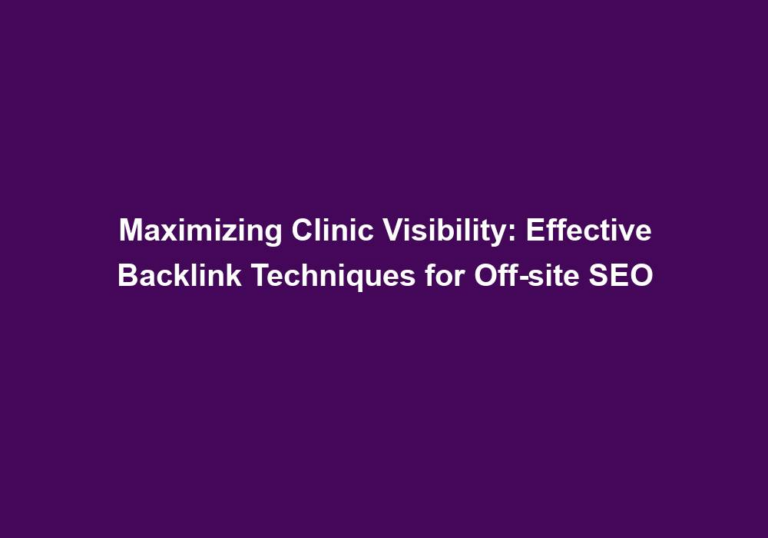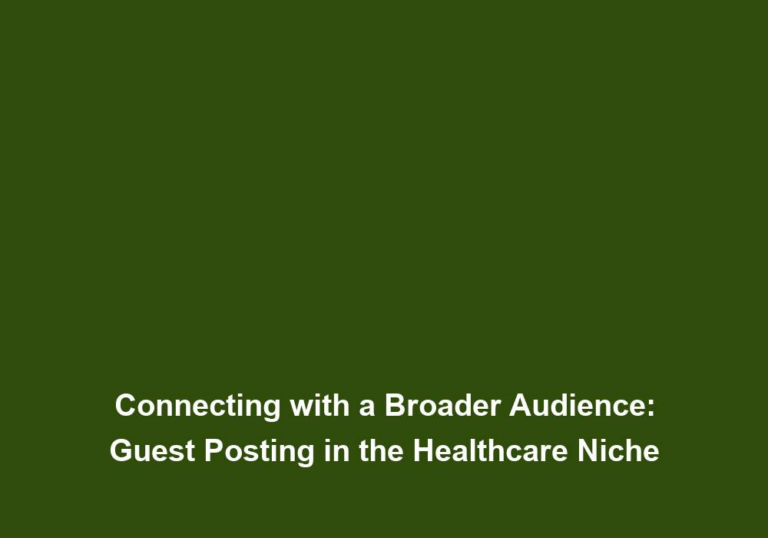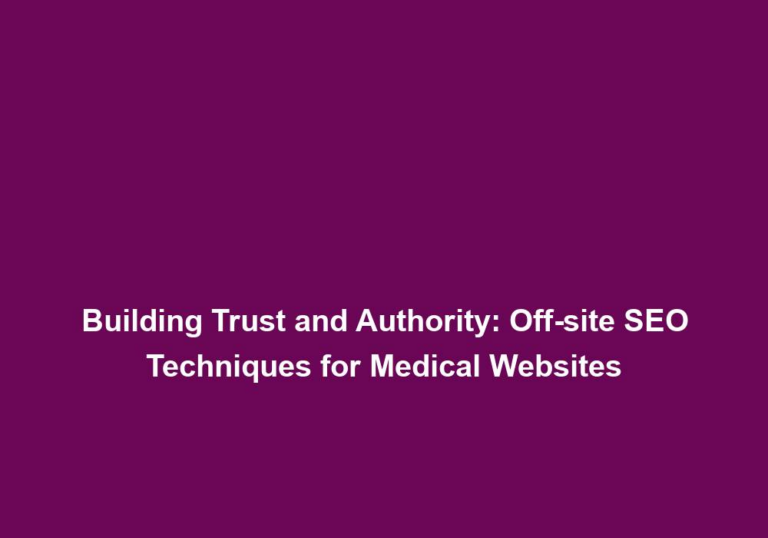Showcasing Medical Expertise: Leveraging Guest Posting for Off-site SEO
As the field of medicine continues to evolve, it has become essential for healthcare professionals to not only provide exceptional patient care but also establish their expertise and credibility in the industry. One effective way to achieve this is through guest posting on reputable websites, which can significantly enhance your online presence and contribute to off-site search engine optimization (SEO) efforts. In this article, we will explore the importance of showcasing medical expertise through guest posting and how it can positively impact your SEO strategy.
The Power of Guest Posting
Guest posting involves writing and publishing content on other websites or blogs to reach a wider audience and increase brand exposure. For medical professionals, guest posting provides a unique opportunity to share their knowledge and expertise with a broader community, positioning themselves as thought leaders in their respective fields.
Establishing Expertise
By contributing high-quality content to authoritative websites, medical professionals can demonstrate their expertise and establish themselves as trusted authorities in their areas of specialization. This not only helps build credibility but also attracts potential patients and fellow professionals who are seeking reliable sources of information. Guest posting allows medical professionals to showcase their knowledge, experience, and unique perspectives, giving them a competitive edge in the industry.
Expanding on this, medical professionals can use guest posting as a platform to delve into specific topics within their field of expertise. By providing in-depth explanations and analysis, they can establish themselves as go-to sources for information. For example, a cardiologist guest posting on a reputable cardiology website can write about the latest advancements in treating heart disease or discuss emerging research on the link between heart health and lifestyle choices. By sharing their insights and staying up-to-date with the latest developments, medical professionals can solidify their position as experts in their field.
Furthermore, guest posting allows medical professionals to address common misconceptions or myths related to their areas of specialization. By debunking misinformation and providing accurate information, they can educate the public and establish themselves as trustworthy sources. This not only helps build their reputation but also contributes to the overall dissemination of accurate medical knowledge.
To enhance the impact of guest posting in establishing expertise, medical professionals can include case studies, success stories, or real-life examples in their articles. By sharing practical experiences and illustrating their knowledge in action, they can further validate their expertise. For example, a dermatologist guest posting on a skincare blog can discuss a challenging case they successfully treated or share before and after photos of patients who achieved significant improvements under their care. These tangible examples provide concrete evidence of the medical professional’s capabilities and can resonate with readers who may be seeking similar solutions.
Expanding Reach
Guest posting on relevant and credible websites exposes medical professionals to a broader audience that they may not have reached otherwise. It helps them tap into new demographics, geographical locations, and target markets, thereby expanding their reach and increasing brand visibility. By reaching a larger audience, medical professionals can attract more traffic to their own websites or social media platforms, ultimately enhancing their online presence and establishing themselves as thought leaders in the medical field.
Expanding on this, guest posting allows medical professionals to connect with a diverse range of readers who may have different backgrounds, interests, and needs. By tailoring their content to resonate with these various audiences, they can attract a wider range of followers and potential patients. For example, a pediatrician guest posting on a parenting website can provide advice on child development milestones, common childhood illnesses, or tips for maintaining a healthy lifestyle for children. By addressing the specific concerns of parents, the pediatrician can establish themselves as a go-to resource for reliable and practical information.
Guest posting also opens up opportunities for medical professionals to network and collaborate with other experts in their field. By engaging with the audience of the website they are guest posting on, they can connect with fellow professionals, exchange ideas, and potentially collaborate on future projects. For example, a psychiatrist guest posting on a mental health blog may attract the attention of other mental health professionals who share similar interests or research focuses. This can lead to collaborations on research studies, joint presentations at conferences, or even co-authoring articles in prestigious medical journals. The networking potential of guest posting can significantly enhance a medical professional’s career and reputation within the industry.
In addition to reaching a broader audience, guest posting allows medical professionals to tap into the existing user base and reputation of the websites they contribute to. Reputable websites often have a loyal and engaged following, which means that guest posts are likely to receive more visibility and engagement compared to posting solely on personal websites or social media platforms. This increased exposure can lead to more shares, comments, and interactions, further amplifying the medical professional’s reach and influence.
Building Backlinks
One of the significant benefits of guest posting for off-site SEO is the opportunity to generate high-quality backlinks. Backlinks are incoming links from other websites to your own, and they play a crucial role in determining search engine rankings. When reputable websites link back to your content, search engines consider your website as more authoritative and relevant, resulting in higher search engine rankings.
Guest posting allows medical professionals to strategically include relevant backlinks within their articles, directing readers to their own websites or specific landing pages. By utilizing targeted anchor text and linking to high-quality content, medical professionals can increase referral traffic and improve their website’s overall visibility in search engine results.
Expanding on this, medical professionals can use guest posting as an opportunity to create backlinks to specific pages or resources on their websites that provide additional value to readers. For example, a nutritionist guest posting on a health and wellness blog can include a backlink to a comprehensive guide they have written on healthy eating habits or a recipe collection for nutritious meals. By directing readers to these resources, the medical professional not only enhances the user experience but also increases the chances of visitors exploring other parts of their website and potentially becoming long-term followers or patients.
Additionally, guest posting allows medical professionals to build relationships with website owners and editors, which can lead to future collaboration and guest posting opportunities. As these relationships develop, medical professionals may have more flexibility in including backlinks to their content, further strengthening their SEO efforts. For example, a dentist who has established a strong relationship with a dental blog may be able to include backlinks to their website in multiple guest posts, increasing their visibility and authority in search engine rankings.
Enhancing Social Proof
In today’s digital age, social proof is an essential factor in building trust and credibility. Guest posting offers medical professionals the opportunity to leverage the reputation of established websites, lending validation to their expertise and qualifications. When readers come across content written by a medical professional on a reputable platform, they are more likely to trust and believe in the information provided. This, in turn, boosts the professional’s reputation and enhances their social proof.
Expanding on this, guest posting allows medical professionals to showcase their affiliations with reputable organizations, institutions, or publications. By mentioning these associations in their author bio or within the content itself, they can further enhance their credibility and social proof. For example, a physician guest posting on a medical journal’s website can highlight their membership in prestigious medical associations or their contributions to well-known medical publications. These affiliations serve as endorsements of the medical professional’s expertise and can significantly influence readers’ perception of their credibility.
Furthermore, guest posting provides an opportunity for medical professionals to engage with readers and build rapport. By actively responding to comments and questions on their guest posts, they can demonstrate their commitment to providing accurate information and addressing readers’ concerns. This direct interaction not only strengthens the medical professional’s relationship with the audience but also reinforces their social proof. Readers who see the medical professional engaging in meaningful discussions are more likely to view them as approachable and trustworthy.
Strategies for Effective Guest Posting
While guest posting offers numerous benefits, it is essential to implement effective strategies to maximize its impact on off-site SEO and medical brand promotion. Here are some strategies to consider when leveraging guest posting:
Identify Relevant Platforms
Before embarking on a guest posting campaign, it is crucial to identify and target platforms that align with your medical expertise and target audience. Look for authoritative websites that cater to the same niche or healthcare specializations. Consider platforms that have a significant following and receive regular traffic. By selecting the right platforms, you can ensure that your guest posts reach a relevant and engaged audience, maximizing the chances of attracting potential patients or collaborators.
To identify relevant platforms, medical professionals can conduct thorough research on popular websites within their field of expertise. They can analyze the type of content these websites publish, the engagement they receive, and the demographics of their audience. This information can help them determine whether a particular platform aligns with their goals and target audience. Additionally, medical professionals can seek recommendations from colleagues, mentors, or professional networks to discover reputable websites that accept guest posts.
Once relevant platforms have been identified, medical professionals should familiarize themselves with the guidelines and submission process of each website. Adhering to these guidelines ensures that guest posts have a higher chance of being accepted and published. Additionally, medical professionals should regularly monitor the websites they have targeted for guest posting opportunities. This allows them to stay updated on any changes in guidelines, submission policies, or content preferences.
Craft Compelling and Unique Content
To capture the attention of readers and stand out in a crowded digital landscape, it is crucial to create compelling and unique content. Your guest posts should provide valuable insights, actionable advice, or thought-provoking perspectives that resonate with your target audience. Avoid regurgitating existing information and instead focus on presenting fresh ideas, sharing personal experiences, or addressing relevant healthcare challenges. By offering unique perspectives, you are more likely to engage readers and establish yourself as an authority in your field.
Expanding on this, medical professionals can use storytelling techniques to make their guest posts more compelling and relatable. By sharing personal anecdotes or patient stories, they can create an emotional connection with readers and make the content more memorable. For example, a nurse guest posting on a healthcare blog can recount a heartwarming experience of caring for a terminally ill patient, highlighting the importance of compassionate healthcare. These personal narratives humanize the medical professional and make their insights more impactful.
In addition to storytelling, medical professionals should ensure that their guest posts are well-researched and evidence-based. Including statistics, studies, or references to reputable sources adds credibility to their arguments and positions them as reliable sources of information. For example, a nutritionist guest posting on a fitness website can support their recommendations for a balanced diet with references to scientific studies or expert opinions. By providing evidence, medical professionals can establish themselves as trusted authorities in their respective fields and differentiate themselves from less authoritative sources.
Optimize for SEO
While guest posting primarily focuses on off-site SEO, it is essential to ensure that your content is optimized for search engines. Conduct thorough keyword research to identify relevant and high-volume keywords that can be incorporated naturally throughout your guest post. Develop a comprehensive understanding of on-page SEO elements, such as meta tags, headers, and internal linking, to enhance the visibility of your content. By optimizing your guest posts for SEO, you can improve their chances of ranking well in search engine results, driving organic traffic to your website.
Expanding on this, medical professionals should pay attention to the readability and structure of their guest posts. Well-organized content with clear headings, subheadings, and bullet points not only improves the user experience but also makes it easier for search engines to understand the context and relevance of the content. Additionally, medical professionals should aim to include relevant keywords in these headings and subheadings to further optimize their guest posts. For example, a psychiatrist guest posting on a mental health blog can include headings such as “Understanding Anxiety Disorders” or “Effective Therapies for Depression” to target specific keywords and improve SEO.
Internal linking is another crucial aspect of optimizing guest posts for SEO. Medical professionals should strategically link to other relevant articles or resources within their own website to create a network of interconnected content. This not only improves the user experience by providing additional information but also signals to search engines that the website is comprehensive and valuable. For example, a physical therapist guest posting on a sports medicine blog can include internal links to articles on injury prevention exercises, post-surgery rehabilitation protocols, or tips for optimizing athletic performance. By directing readers to related content, medical professionals can enhance their website’s overall SEO and encourage visitors to explore more of their resources.
Foster Relationships and Collaboration
Guest posting should not be treated as a one-time opportunity but rather as a stepping stone for building long-term relationships and collaborations. Engage with the website owners or editors, respond to comments on your guest posts, and actively participate in the community. By fostering relationships, you can increase the likelihood of being invited back for future guest posts or even explore other collaborative opportunities, such as co-authoring articles, participating in webinars, or contributing to podcasts. Building strong relationships within your niche can amplify your reach and establish you as a prominent figure in the medical industry.
Expanding on this, medical professionals can use guest posting as a platform to showcase their willingness to collaborate and contribute to the community. By actively engaging with readers and responding to comments, they demonstrate their commitment to sharing knowledge and addressing concerns. This interaction not only builds rapport but also increases the chances of being approached for future collaborations. For example, a surgeon guest posting on a healthcare blog can offer to answer questions related to their expertise in the comments section, providing valuable insights and fostering a sense of community.
Additionally, medical professionals can leverage their guest posts to promote collaborative projects or initiatives they are involved in. By mentioning these projects within their guest






